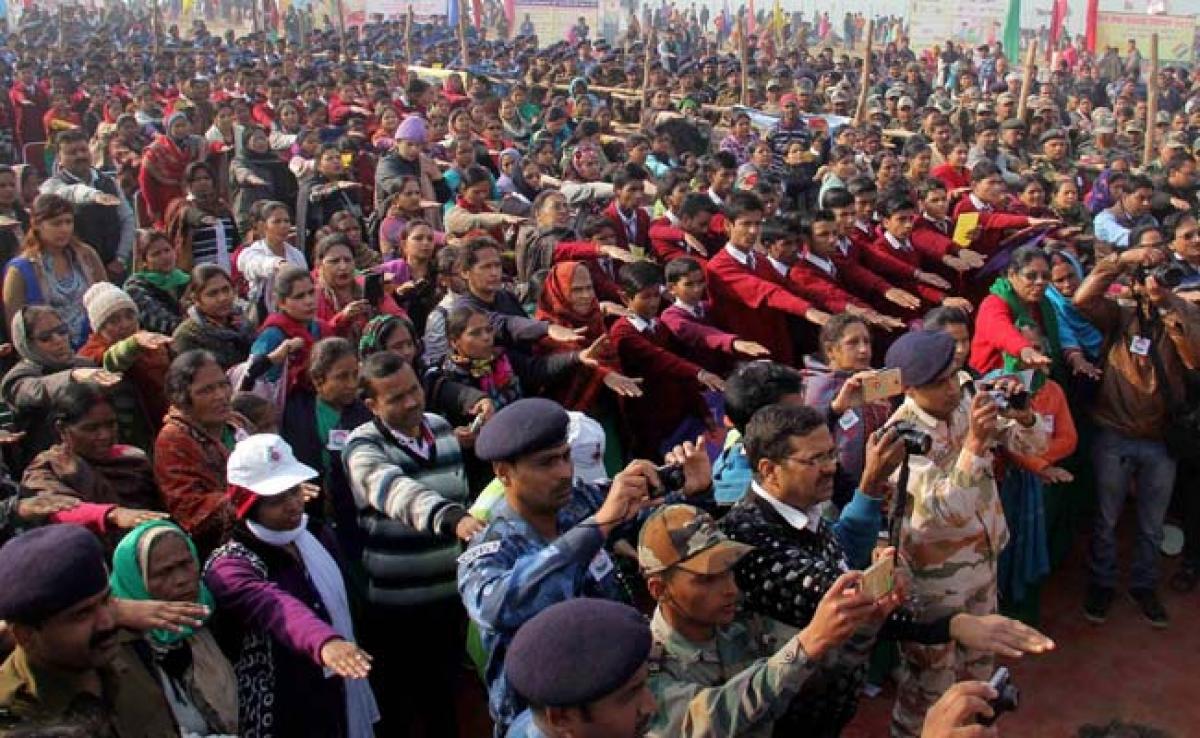Live
- Vedamrit Honey’ launched
- Arjun Das Brings Mufasa to Life in Tamil
- Odisha move to prepare maritime perspective plan
- Jal Jeevan Mission empowering women in rural areas: PM Modi
- Pradhan urges Nadda to set up pharmacy unit in Odisha
- Assembly winter session ends ahead of schedule
- Nepali Army Chief General Ashok Raj Sigdel Strengthens Ties With India In Four-Day Visit
- BRS MLAs, MLCs Skip Second Day of Orientation Classes
- Andhra Pradesh Student Dies in Tragic Car Crash in Leicestershire, 4 Others Injured
- Oppn assails delinking of Waltair div from ECoR
Just In

Once a much-talked-about issue during election campaigns, the division of Uttar Pradesh no longer finds favour with key political parties - at least this time round. Promises to carve out Harit Pradesh (western UP), Poorvanchal (eastern UP), Bundelkhand and Awadh have been pushed to the back burner with no party pushing for the division of UP - India\'s largest state in terms of population and four
Once a much-talked-about issue during election campaigns, the division of Uttar Pradesh no longer finds favour with key political parties - at least this time round. Promises to carve out Harit Pradesh (western UP), Poorvanchal (eastern UP), Bundelkhand and Awadh have been pushed to the back burner with no party pushing for the division of UP - India's largest state in terms of population and fourth in terms of area.
The Bahujan Samaj Party or BSP, headed by Mayawati, was once a strong supporter of the demand to corner ruling Samajwadi Party on development and law and order issues, maintaining that smaller states could be governed in a much better and efficient manner. Dalit icon BR Ambedkar, the architect of the Constitution of India, had recommended division of Uttar Pradesh for better governance in his book "Bhashayi Rajya".
When her government was in power in Uttar Pradesh, then Chief Minister Mayawati had first raised the issue way back in 2007 and her government had even adopted a resolution in the state Assembly seeking division of the state into four parts. Not only has BSP dropped the demand this time, even ruling Samajwadi Party is silent on the issue fearing that such a development might harm its electoral prospects while giving an edge to BJP, Rashtriya Lok Dal (RLD) headed by Ajit Singh and Congress.
Keeping in mind better governance, both BJP and Congress had supported the resolution brought by Mayawati in the House. But, as Mayawati lost power in 2012 and ended up with just 80 seats against 206 seats in 2007, her demand lost steam and the issue surprisingly finds no mention in manifestos of other parties or in speeches made by their leaders.
Even BJP, whose stakes are high in the UP elections, has skirted the issue though the party even recently used to emphasise on giving recognition to regional aspirations, which, in other words, meant decentralisation through smaller states. The BJP-led NDA had carved out Uttarakhand, Jharkhand and Chhattisgarh from UP, Bihar and Madhya Pradesh respectively, giving rise to speculation that it might favour further division of Uttar Pradesh on the basis of better and efficient governance. But, its 2017 UP poll manifesto doesn't mention the issue and speaks only about setting up Bundelkhand and Poorvanchal development boards if voted to power in UP.
All the more interesting is the fact that Ajit Singh's RLD, which used to sing the Harit Pradesh tune during every election, is silent on the issue, which even five years ago was central to campaigning by almost all political parties.
Besides RLD, Raja Bundela's Bundelkhand Congress, Kalyan Singh's erstwhile Jan Kranti Party, Amar Singh's now defunct Rashtriya Lok Manch and Ayub Khan's Peace Party -- all pitched for the division of the state -- but most of them drew a blank in the Assembly elections in 2012.
While Mayawati's strength dropped to 80 seats from 206, RLD got nine - one less than the previous tally, and Peace Party could get only four. On the other hand, Samajwadi Party, the only party to oppose the demand, stormed to power with a landslide victory, bagging 224 of the 403 Assembly seats.
Analysts said one reason could be the fact that people took pride in being residents of one of the country's biggest states and did not wish to give up that identity.

© 2024 Hyderabad Media House Limited/The Hans India. All rights reserved. Powered by hocalwire.com







